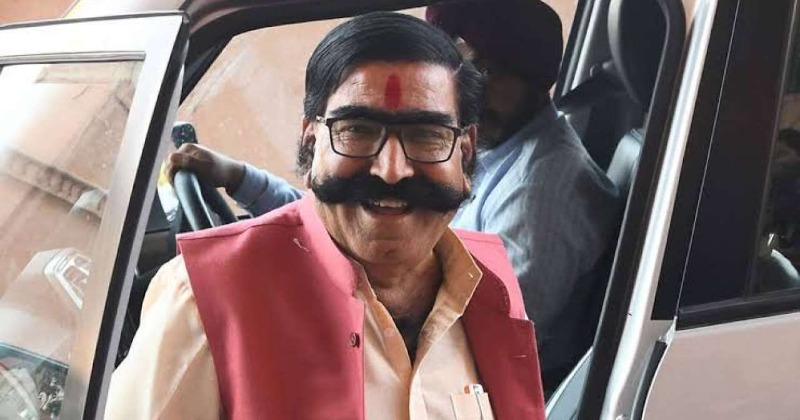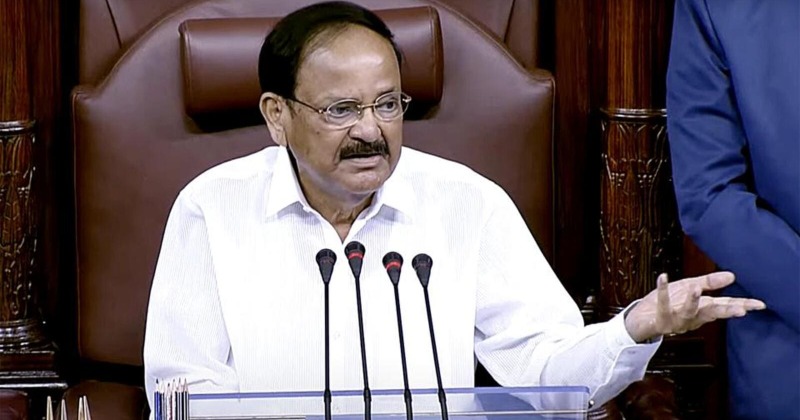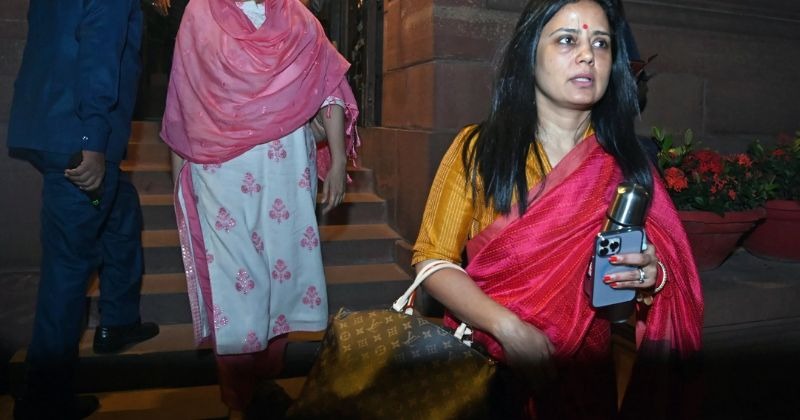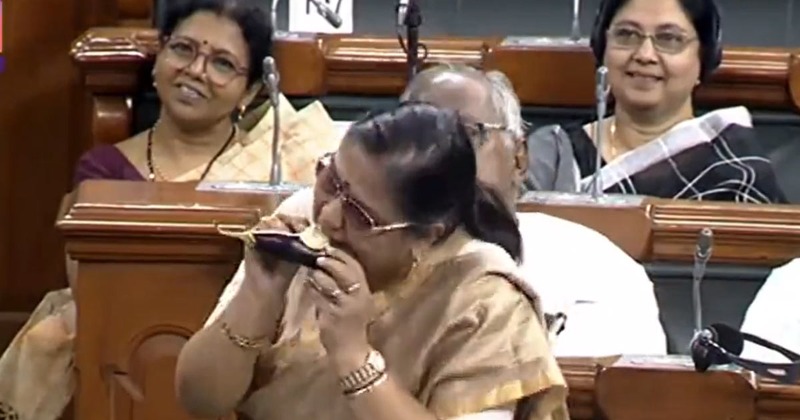A couple of months after Pennsylvania’s Democratic Senate candidate John Fetterman had a stroke in May, his Republican opponent and former TV personality Mehmet Oz posted a link to his more than 3 million Twitter followers. “Hoping to make it to a *Fetterman for Senate* campaign event? Details are linked below!”
The website, paid for by Oz’s campaign, depicted Fetterman as an overweight, shirtless and “lazy” “basement bum” as he recovered. Fetterman returned to the campaign trail in mid-August and leads Oz, who’s been endorsed by Donald Trump, in the latest polls.


Republican Senate candidate Mehmet Oz attacked his opponent as “lazy” for not campaigning enough. Fetterman, a Democrat who’s leading in the polls, returned to the campaign trail three months after his stroke.
Dr. Oz Twitter
The move instantly became the subject of national talk shows, cementing social media even further as America’s latest battleground ahead of the 2022 midterm elections. And that battle is turning bleak.
Many candidates are now following in the steps of Trump, whose frequent harassing, bullying and rule-breaking posts to Twitter turned the political world upside down during his 2016 bid for the White House and then his four years in office. As a result, political and social media researchers say, the midterm elections have seen Trump-like behavior become the norm rather than the outlier. Candidates and elected officials are more often taking to Twitter to spread lies and disinformation, to attack their perceived enemies, and to troll fellow politicians.
Further, a majority of Republican nominees on the ballot for this November’s midterm elections have denied or questioned the outcome of the 2020 presidential election, according to a report from the Washington Post, posing a threat to America’s democratic principles.


CNET
On some extremist-filled alternatives like Gab and Telegram, candidates are calling for civil war and advocating violence against the government while they echo Trump’s rhetoric that their political opponents are evil.
“Time to take the gloves off,” Florida Republican congressional candidate Laura Loomer wrote on the social networking apps Gab and Telegram in August after a scandal over Trump’s reported hiding of top-secret government documents at his Mar-a-Lago residence and golf club triggered a raid from the Federal Bureau of Investigation. Loomer, who’s described herself as “pro-white nationalism” and a “#ProudIslamaphobe,” continued to attack the FBI even after the Department of Justice said it found many of the US government’s most sensitive secrets at Trump’s complex, despite his staff’s declarations they’d already been returned.
“If you’re a freedom loving American, you must remove the Words decorum and civility from your vocabulary,” Loomer wrote. “This is a WAR!” She was banned from Twitter in 2018 for violating the site’s rules against hateful conduct.
Just south of her, Republican Luis Miguel, a candidate for the Florida House of Representatives, took it a step further. “Under my plan, all Floridians will be able to shoot FBI, IRS, ATF, and all other federal troops on sight,” Miguel tweeted. “Let freedom ring.”
These posts are extreme, and in Miguel’s case got him reportedly banned from Twitter. Both candidates lost their primary bids. They also didn’t respond to requests for comment. But experts say their approach to social media follows a pattern of dangerous internet-grown fanaticism invading the political world, particularly on Twitter.
People may turn to massive platforms such as Instagram, TikTok and YouTube to get the latest news on their favorite celebrities, talk about big sports games or participate in the hottest new trend. But Twitter in particular has solidified its foothold in American politics, turning into a crucial tool for lawmakers to communicate with both their constituents and the media organizations that follow them. And the results have dramatically reshaped the political process as well.
“In the last 10 years, we’ve seen an increase in the amount of resources devoted to social media,” said Bradford Fitch, head of the nonpartisan Congressional Management Foundation, which works with lawmakers’ offices to help improve how they operate. Congressional offices now typically have two people devoted to media, rather than one person a decade ago, he added. And more lawmakers are now posting to their accounts, rather than having aides do it for them.
“On some level because it hits and accelerates the national psyche,” he said. “We are seeing over time, the incentives are for members of Congress to be outrageous.”
Tesla CEO Elon Musk, one of Twitter’s most-followed users who’s finalizing a $44 billion purchase of the company, has said he plans to remove the few guardrails Twitter has to discourage harassment and bad behavior. Such a move has been widely criticized by civil rights and anti-hate groups, including the Anti-Defamation League, who say Twitter needs more moderation, not less.
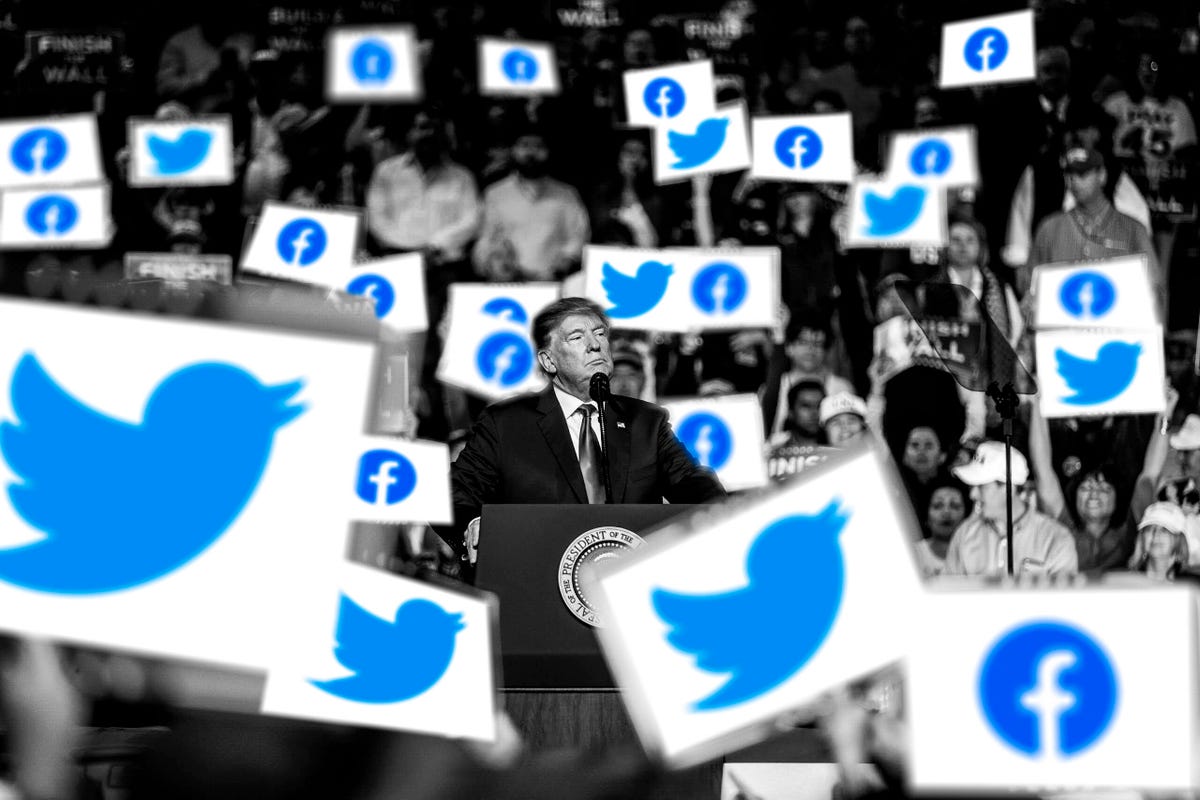

Donald Trump was suspended from Twitter, Facebook and others following his comments supporting people who attacked the US Capitol on Jan. 6, 2021.
James Martin/CNET
Of course, social media didn’t create hyper-partisan lawmakers. Congress has over the years been home to plenty of bullies, conspiracists and other unsavory types. In the 18th century, for example, two lawmakers got into a brawl on the floor of the House of Representatives over the country’s diplomatic approach to France. In the 19th century, one senator drew a pistol and pointed it at his rival in the Senate chamber during a debate over slavery. Though today’s antics are comparatively tame, there are still plenty of lawmakers who pushed conspiracy theories about everything from climate change to the racist lie Trump himself promoted that President Barack Obama wasn’t born in the US, thus disqualifying him from public office.
Meanwhile, attention online isn’t a guarantee of success. Freshman North Carolina Rep. Madison Cawthorn quickly became a right-wing social media star when he was sworn in as one of the youngest lawmakers ever. Though he’d become a celebrity, controversy soon followed. He lost his seat to a lesser-known Republican primary opponent in May.
Social media has even changed how lawmakers communicate when they’re at home and at the US Capitol. Fitch’s research found that members are much more partisan on social media when they’re in DC, rather than the people-pleasing persona they take on at home.
Republican strategists have said social media offers another telling benefit. Posting online allows politicians to circumvent traditional news organizations that often ask questions and hold them accountable for whether they’re spreading a lie or telling the truth.
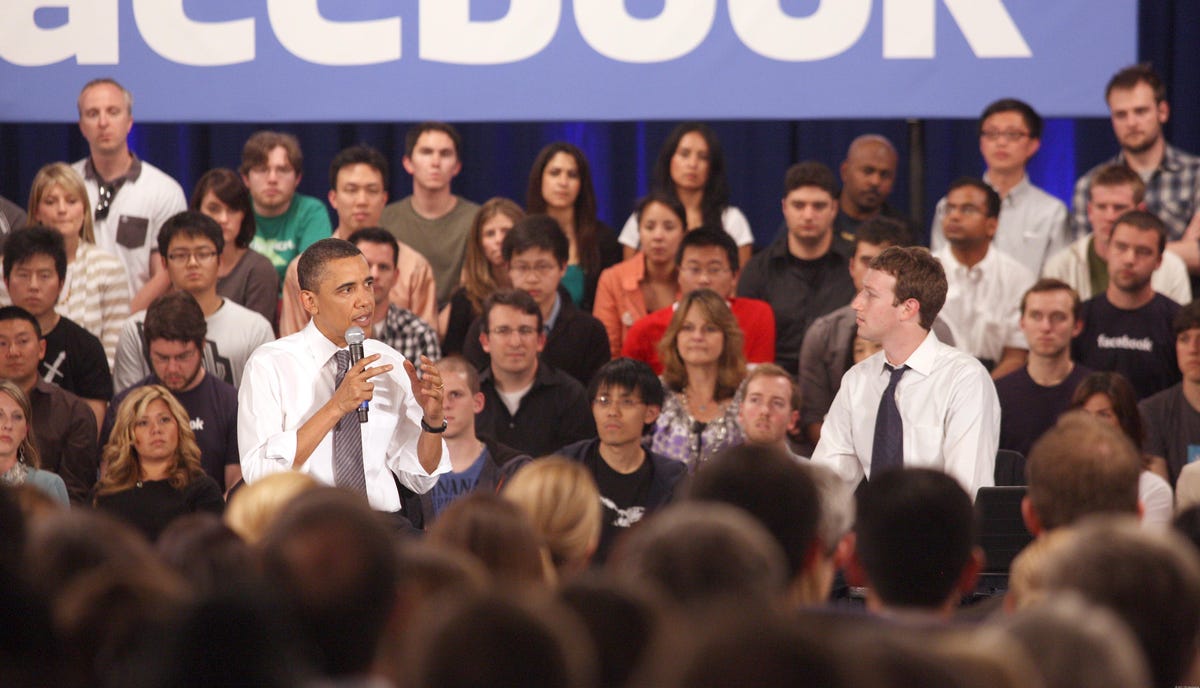

Barack Obama’s first bid for the White House in 2008 was one of the first truly online presidential campaigns.
Declan McCullagh/CNET
Social media wave
Trump’s 2016 campaign and his four years as president ushered in a new era of extremism among lawmakers, but he wasn’t the first elected official to use social media.
Most historians and industry experts point back to Barack Obama, whose 2008 presidential campaign used websites and social media to share videos watched by more than 50 million people on YouTube alone, according to researchers at Stanford’s Graduate School of Business. Obama’s campaign also sent out messages to its 13 million-member-strong email list, created a specialized volunteer social network with more than 2 million profiles and took in more than $500 million in online donations.
Obama’s messages weren’t extreme like Trump’s. Obama’s team treated social media as more an arm of his presidency than a window into his mind. Trump tweeted about everything from discussing the latest TV ratings to attacking immigrants to dismissing gay rights, as well as making threats of military action that could trigger a nuclear war.
Many of Trump’s pronouncements were quickly labeled as racist, sexist and anti-Muslim, but that only appeared to strengthen his appeal. “He was the one saying the things people were thinking,” said Mike Rothschild, a journalist whose book The Storm Is Upon Us dissects the social media-fueled conspiracy theory QAnon, which focuses on Trump’s rumored efforts to fight his perceived enemies. “It’s the politicizing of everything.”
At first, Republicans in DC scoffed at Trump’s style. But after he won the presidency in 2016, they began to emulate his approach. And many of them received similar attention too.
On Jan. 3, 2021, Lauren Boebert, a little-known freshman congresswoman and owner of a gun-themed bar from Rifle, Colorado, posted a campaign-style video to Twitter after arriving in Washington, DC. In it, she confidently walks down a Capitol Hill street with a gun on her hip.
“Even though I now work in one of the most liberal cities in America, I refuse to give up my rights, especially my second amendment rights,” she can be heard saying amid rock ‘n’ roll-inspired background music. “I will carry my firearm to DC and in Congress.”
It was effective. The 33-year-old congresswoman racked up more than 6 million views, over 10,700 retweets and 51,300 likes.
Let me tell you why I WILL carry my Glock to Congress. Government does NOT get to tell me or my constituents how we are allowed to keep our families safe.I promise to always stand strong for our 2nd Amendment rights.https://t.co/E75tYpdN4B pic.twitter.com/qg7QGenrNo
— Lauren Boebert (@laurenboebert) January 4, 2021
Boebert and her colleagues like Georgia Rep. Marjorie Taylor Greene have not just used their accounts to stake out positions and attack critics but also to regularly fundraise and sell merch too. Greene moved many of her posts to the messaging app Telegram after Twitter banned her account earlier this year for repeatedly spreading COVID disinformation. A hat she sold after the Trump raid declared, “Defund the FBI.”
Boebert, Greene and Cawthorn were among the 147 Republicans who voted to overturn the 2020 election results on Jan. 6, 2021.
Not all lawmakers are using Twitter to harass colleagues or spread lies. New York Rep. Alexandria Ocasio-Cortez, a notable liberal star, has also become a national figure in large part because of her Twitter and Instagram use. She typically posts about key moments from congressional hearings, her positions on important issues, clap-backs at critics and the occasional personal moment, like her success playing the online battle game League of Legends.
But what’s stood out about an increasing number of lawmakers, Rothschild says, is that they’re not just extending political debates and their process to the online world. Many of them are on the extreme right, and they’re posting wild comments like Boebert’s promise to carry her gun on Capitol Hill. The posts speak to their base and grab attention from critics, whose outrage often helps drive their message even further.
“You’re seeing this filter down to state and local council meetings, where people show up and spout crazy stuff and it goes viral,” he added. “It turns everything into a Twitter argument.”


Donald Trump’s shadow looms large on Twitter, even though his account was permanently suspended.
James Martin/CNET
Social media frenzy
A lawmaker’s ability to grab attention on social media may be a critical part of campaigning, but it’s not a guaranteed path to success. Some lawmakers have gone from shining stars to sudden flameouts, in part because of their bombast.
One such member was Cawthorn, the far-right representative from North Carolina who quickly drew a following for sharing conspiracy theories on his social media accounts, including some related to QAnon. Cawthorn focused so much on messaging that he told Republican colleagues, “I have built my staff around comms rather than legislation,” according to a 2021 memo obtained by Time magazine.
But he also had Trump’s habit of making comments that were later criticized as false or misleading, including his own admission that a campaign video ad claiming he had planned to serve in the Navy “with a nomination to the US Naval Academy in Annapolis” wasn’t true. Shortly after he accused other Republican lawmakers of participating in drug-fueled orgies earlier this year, he lost his seat to a nationally unknown primary challenger. He’ll leave office in January.
Meanwhile, Twitter permanently suspended Trump from its site after his fiery rhetoric, threats and efforts to overturn his loss of the 2020 presidential election helped to fuel the Jan. 6, 2021, attack on Congress. And Greene was stripped of her committee assignments in February after her apparent support for violence against her political opponents.
Lawmakers appear to be shifting strategy in response. Both Trump and Greene have decamped to alternative social networks. Trump built his own Truth Social, which allows him to post whatever he wants though it bans many of his critics.
Others like Loomer and Greene, meanwhile, have begun relying on peer-to-peer messaging apps like Telegram, which aren’t as public facing as a Twitter account but also don’t draw as much criticism or moderation either. “They can be easily forwarded, they’re targeted to supporters, and they aren’t easily tracked,” said Betsy Sigman, a distinguished teaching professor emeritus at Georgetown University’s McDonough School of Business.
For now, at least, candidates like Pennsylvania’s Oz appear focused on mainstream social media apps like Twitter and Instagram. That’s where Oz has continued posting articles and videos attacking Fetterman’s stroke recovery.

